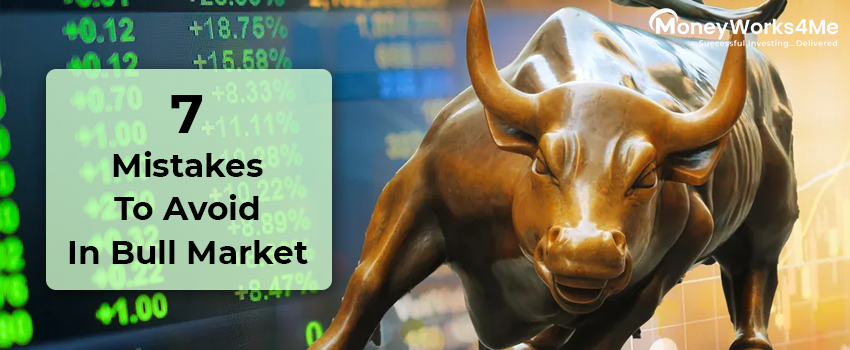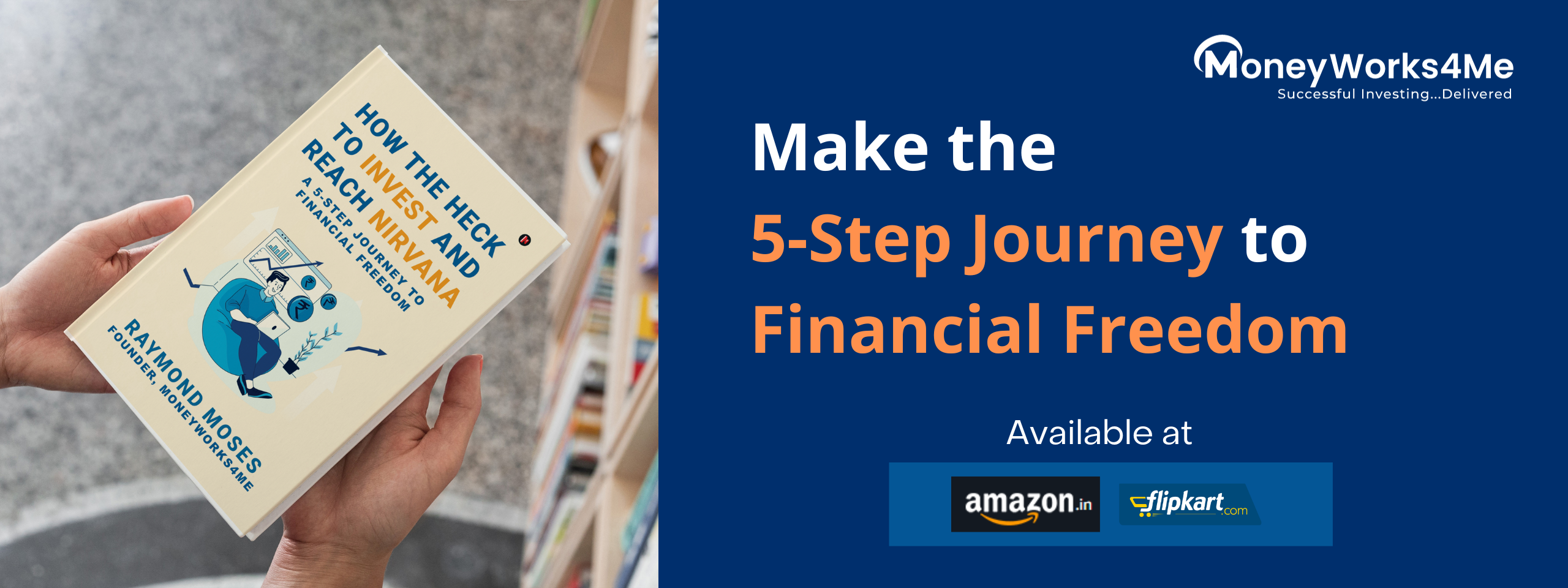A bull market is an exciting place and a bull rally is as exhilarating as a roller coaster ride for an investor. Every other trade ends up making tons of money, investors broadcast their exceptional returns on social media and in personal networks, and the overall market sentiment is highly positive. Nothing can go wrong, or at least that’s what a typical retail investor thinks when he/she takes up investing in a bull market.
Ironically, even though everyone feels like a genius and a successful investor in a bull market, it’s very easy to make mistakes during a bull rally. While the fear of making mistakes shouldn’t stop you from investing, it’s definitely beneficial to learn from history and the examples of others and invest smartly.
Here are 7 most common mistakes that retail investors make in a bull market and which you can easily avoid:
1. Being Greedy When You Should Be Cautious
A bull market is actually the time to be cautious and invest sparingly in opportunities with positive future potential. What retail investors do, on the other hand, is get greedy and run after stocks that have been delivering good returns till then. Many of these stocks may have run beyond their fair value (or MRP as we call it) and are due for a price correction soon, which means that the investors entering towards the run a significant risk of losing their money.
However, the pull of a bull rally is so strong that investors forget about checking stock valuations and the fundamentals of the companies they buy. Such emotional investing sets up investors for repeated failures and diminished returns over the long term. This only ends upon them being disappointed or at times losing faith on investing.
2. Drastically Changing the Investment Process
Mistakes are not only made by new investors; even experienced investors get lured in by the pomp and show of a bull run. In fact, investors are known to change their risk profile as the market undergoes significant changes. Investors who were risk-averse or cautious in a bearish market can turn highly optimistic and consider several risky trades for investment.
This change in risk profile causes them to even change their tried and tested investment process. Instead of doing thorough research of stocks or funds before investing, investors may select opportunities that are hyped and overly discussed in media. Influencers, brokers, or anyone who hasn’t done sound research but has booked a profit in the market can affect the investment decision of retail investors who find bull markets fascinating.
3. Suddenly Switching from Mutual Funds to Stocks
Exceptional stock returns in bull markets convince retail investors that mutual fund investments are a waste of time and the best way to make money is through directly investing in stocks. Even investors who had remained invested in mutual funds for years and earned double-digit returns can become restless thinking that they are missing out on some multi-fold gains. This restlessness can lead them to divest from mutual funds and start investing directly in stocks.
While it’s good to make this transition gradually, doing so during a bull rally and without sufficient knowledge of stock investing can be disastrous. Mutual funds are designed with diversified allocations in debt and equity-linked instruments to sustain market volatility and give reliable returns. When investors make a sudden switch from mutual funds to stocks, they lose their safety net and expose their capital to significantly higher risk. On top of that, there’s no guarantee of the selected stocks giving similar or better returns than the mutual funds from which money was pulled out.
4. Picking-up Intra-day and F&O Trading
Just as some investors move away from the relative safety and stability of mutual funds towards direct stock investments, others expand their risk horizons even more! Bull markets coax otherwise passive investors to pick up intra-day trading and explore the world of futures and options. Such margin-based, leveraged trading exposes investors to 4-5 times more risk than their invested capital.
Good trade in this space can multifold the investor’s earnings. But a single bad trade can completely wipe out all their gains and leave them with nothing after years of investment. Although an upward moving market is the best place to try Intraday trading and book small, yet frequent profits; entering into this leg of investing without preparation is beyond risky as it puts the wealth generation process on a toss.
5. Exploring and Investing in Trending IPOs
Buoyant markets are also seen as the best time by companies to launch IPOs and raise capital from institutional as well as retail investors. While institutional investors are protected by their teams of financial analysts and risk mitigation strategies, retail investors don’t have this luxury. Feeling optimistic after initial success in trading and investing in fast-growing stocks, retail investors also open up to the possibility of investing in IPOs.
The problem is that in bull markets, IPOs can be over-valued and expensively priced. If a market correction follows soon, much of the investment done in a pricey IPO can turn into nothing. Instead of betting on trending IPOs, investors should look at the financials of the companies offering the IPO, their outstanding debts, and whether the money is being raised for business expansion or not.
6. Not Selling at a Right Time
Another common mistake that retail investors make in a bull market is that they overlook the possibility of selling stocks that may have reached their peak. Booking partial profits and exiting certain stocks that are poised for devaluation or price correction can help investors maximize their returns. Selling at a right time is as important as buying at the right time and right price. But the expectation of larger profits, fueled by greed, encourages investors to stay invested.
Some investors even deliberately maintain their asset allocation and refuse to make any changes in their portfolios. Such rigidity and unnecessary loyalty to purchased stocks cost them when the market corrects sharply.
7. Investing in Selective Sectors and Themes
Lastly, some investors try to be extra smart and invest only in sectors and market trends that have been paying off well. For instance, IT and Pharma stocks grew exorbitantly after the market started recovering post-Covid19. Several investors mistook such double and triple-digit returns in these sectors as a sign of future profits. They invested in these sectors during the early bull rally, but eventually, as the growth in these sectors started slowing down and the stock prices of their companies started correcting, bullish investors started losing money. In bull markets, diversifying and investing in future prospects remains as important as it is at any other time. Investors who forget this thumb rule, suffer heavily.
In a nutshell, bull markets are great for booking profits on previously held investments that have grown in value and enjoy a period of positivity and wealth creation. They are, however, not the place to forget all your hard-earned investment lessons and best practices. By staying patient and steadfast to your investment process, you can avoid all these mistakes in a bull market.
Best Stocks From:
Top 10 Stocks in India Best EV Stocks in India Screener Alpha Cases Best 5G Stocks in India Top AI Stocks in India Best Drone Stocks in India Best Defence Stocks in India Top 10 Infrastructure Stocks in India Best Fintech Stocks in India Best Manufacturing Stocks in India Best Liquor Stocks in India
Need help on Investing? And more….Puchho Befikar
Why MoneyWorks4me | Call: 020 6725 8333 | Ebook | WhatsApp: 9860359463
*Investments in the securities market are subject to market risks. Read all the related documents carefully before investing.
*Disclaimer: The securities quoted are for illustration only and are not recommendatory












